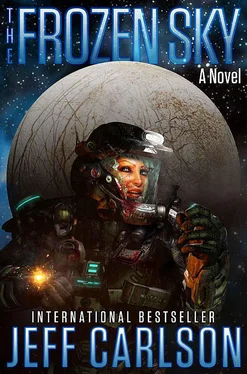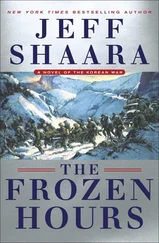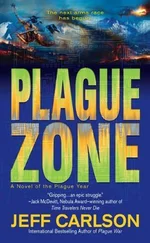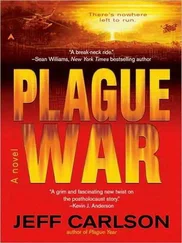In addition to performing final, hands-on site inspections, I was also conducting field tests of myself. Before creating other “mods,” Aro Corp. wanted to see if unforeseen problems would arise, physical, mental, or emotional.
I was glad for the test period. In three months, I would become a teacher and a foreman, caged by responsibility. Meanwhile, I explored natural altars of rock and coral, spread my arms to ride rip-currents, and chased quick clouds of fish.
One morning, I caught a yellowtail. Its buttery flavor was complemented well by sour kelp. I began to forage instead of eating only from the tubes on my food belt — secretly, truly making myself a part of this environment.
The work itself was more fun than difficult, placing beacons and running spot checks on our communications net. The attenuation of radio waves is very high in salt water, even for the military band VLF signals that Aro Corp. had leased from the U.S. Navy. They wanted to be sure they could always reach me, but there were dead areas within the construction zone. During the first twenty days, we added five more relays than they’d originally allowed for in the budget, three on the sea floor, plus two additional surface buoys whose anchoring tethers also functioned as antennae.
The grid was set. The smaller boats that had helped me through this initial stage were replaced by a barge, capable of lowering heavier and larger gear. The first steel cradles for the turbine mounts were coming down.
For a country that had been almost entirely nuclear-powered for decades, Japan had a wretched safety record, averaging two and a half accidents per year. Worse, loss of containment at eleven reactors during the war had done more damage than North Korean missiles. They were desperate for a solution.
Aro Corp. hoped to rev up a quad of turbines as soon as possible, not so much to offset costs but to prove to critics and nervous investors that the idea was fundamentally sound. The complete project, involving hundreds of turbines, channelers, and land-based transformers, wouldn’t be finished for four years — and of course Aro Corp. hoped construction would continue for most of the century as they developed other locations around the globe.
I worked nine- and ten-hour shifts, sometimes arguing with Stenstrom when he wanted me to come in. I’m no hero. I was angling for a bonus.
My gung-ho attitude was also based on the fact that my camp on the lee side of Miyake held little appeal. Sleep was always welcome, but any messages the boys had sent tended to make me feel lonely, and then there was nothing to do but wait and brood, composing inarticulate letters to Andrea that I usually deleted.
I was tired when my robot tug brought me to deeper water east of the island. We’d completed inspection of the last sites a week early and the engineers wanted back-up options.
As I kicked away from the tug, a familiar thrill shot through my exhaustion. Beyond this shelf, the sea floor plunged away for miles . This place was like another planet, strange and new, and I was the very first.
The squid didn’t hesitate. Its only predators were much larger and shaped differently than me. As I drifted into range, holding a small mapping computer to my face, the giant latched onto my left elbow and biceps with its two longer, grasping tentacles.
Just weeks before, I might have yelled. But in this world there was nobody who could come to help.
I tried to kick away. No good.
Its eight regular arms spread in a horrible, ash-yellow blossom. When I switched to sonar the squid seemed even larger, backed by a spotty, rising cloud of silt.
I dropped my computer, bumping one of the squid’s closing arms. It hesitated, grabbing the small device, but at the same time the pair of stronger tentacles around my left arm reflexively increased their grip. My armor tore open. So did the softer muscle beneath. Blood squirted out in diffuse threads and I was lucky not to suffer a stroke, but too frantic to realize it at the time.
My fletchette gun was holstered on my left forearm beneath the tentacles. I groped for the knife strapped to my leg, but another of the squid’s arms brushed my foot, then seized hold, and I yanked my free hand away before it was also trapped.
“Garcia! Garcia!” Stenstrom’s voice felt like part of the adrenaline-pulse throbbing through my head.
I kicked not away from the squid but into it, winning slack from its tentacles, using this moment of freedom to twist sideways. Its arms closed in. My face and left arm led toward the monster’s hard, gaping beak. Then my free hand found the gun and squeezed off three-quarters of a magazine, tearing open the back of my left ring finger.
The squid nearly exploded. Its shattered beak seemed to keep opening, spilling flecks of torn innards. The convulsing tentacles yanked my shoulder from its socket and peeled away more armor and skin, but another burst of fletchettes freed me and I swam away.
The current made restless ghosts of its gore and mine.
Consciousness faded to a glimmer, but the thought of sharks kept me swimming—
#
I don’t remember the ride or the hammerheads that came after me. The shouting in my cheekbone, that much I recall. Stenstrom’s panic was too intimate to forget. Trying to reload the fletchette gun with one functional arm while clinging to the tug was a monumental task. They say I did it twice, which must be why it seemed like I never finished.
The sea is no place for the weak or wounded.
#
Andrea never wanted me to volunteer, not because of any danger or even because of what they’d do to me, but because it would take so long. We’d argued before, like all couples, silly stuff like who was supposed to take out the garbage, and we’d had bitter discussions after she got pregnant.
At the time I was just twenty-seven after ten years in the strict, almost exclusively male world of Special Forces, and I had not proved myself excellent family material by butting heads with her son Brent. But until I told her that I needed to leave, we had always found a compromise. She let me name our baby after the father I’d never known — and I agreed to be more lenient with Brent, let him choose his own friends and music and clothes.
We’d never shouted before. She’d never cried before.
“We don’t need this,” she said, but we did. If we wanted to give Roberto and Brent the education they’d need, if we ever expected to live someplace where sirens and knifings weren’t regular affairs, a chance like this was too fat to pass up.
The politicians said the recession had ended in ’17, but that was news to us. The SCUBA guide business I’d started after I got out of the Navy failed almost immediately. I should have known better. The tourist trade had been flat for years and my competition, already well-established, gobbled up what little income there was to be had.
We weren’t destitute. Andrea subbed as a math teacher wherever she could, we both did spot work for the Park Service, and I made wages on the docks as a mechanic and welder. But I missed the simple vacations we’d taken in the early days, surfing, kayaking. To be reduced to a life of debt, coupons, and freebies was hardly a life at all.
The real horror had been the resentment with which I’d begun to view my family, for needing so much I couldn’t give.
On the day before I left, Andrea argued that I’d undervalued my soul. “Two years,” she kept saying. “Don’t leave us alone for two years.”
“We’ll talk every week,” I promised.
“Two years, Carlos. The boys won’t even recognize you.”
#
Stenstrom opted for a swimsuit when he visited, which was all that I was wearing. To perform their repairs and to let me heal, the doctors had turned me into something of a surface creature again, enclosing my head in a large plastic sphere that piped in salt water, placing me on a table lined with gutters to collect my liquid exhalations. Keeping my skin damp was more complicated.
Читать дальше












